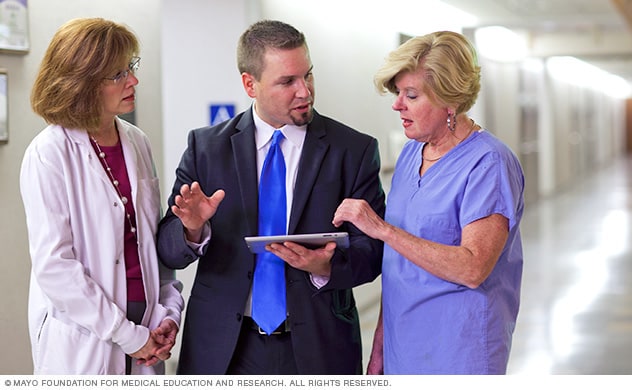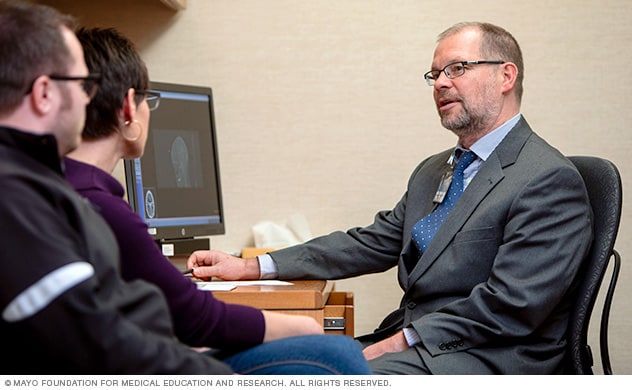Epilepsy care at Mayo Clinic
 Teamwork
Teamwork
Mayo Clinic experts in epilepsy care work together to provide individualized care to each patient.
Your Mayo Clinic care team
Mayo Clinic's world-renowned epilepsy teams include neurologists, neurosurgeons, imaging specialists (radiologists), mental health specialists (neuropsychologists) and other professionals who work together to provide exactly the care that you, your child or your family needs.
The Mayo Clinic Epilepsy Clinic brings together these experts to offer care that's focused on both the person with epilepsy and the person's family. Children with epilepsy visiting the Mayo Clinic Children's center receive compassionate, warm care that focuses on the whole family's integral role in epilepsy treatment.
Having all of this subspecialized expertise in a single place, focused on you, means that you're not just getting one opinion. Your care is discussed among the team, your test results are available quickly, and appointments are scheduled in coordination. The most highly specialized epilepsy experts in the world are all working together for — and with — you and your family.
What might take months to accomplish elsewhere can typically be done in only a matter of days at Mayo Clinic.
Mayo Clinic in Rochester, Minnesota, Mayo Clinic in Phoenix/Scottsdale, Arizona, and Mayo Clinic in Jacksonville, Florida, rank among the Best Hospitals for neurology and neurosurgery in the U.S. News & World Report Best Hospitals rankings. Mayo Clinic Children's in Rochester is ranked the No. 1 hospital in Minnesota and the five-state region of Iowa, Minnesota, North Dakota, South Dakota and Wisconsin, according to U.S. News & World Report's 2025-2026 "Best Children's Hospitals" rankings.
 Care focused on you
Care focused on you
At Mayo Clinic, doctors take the time to listen and understand your concerns so that you get exactly the care you need.
 Personalized care
Personalized care
At Mayo Clinic, your doctor takes the time to listen to you and understand your needs.
Advanced diagnosis and treatment
New technologies can accurately find the seizure focus.
Click here for an infographic to learn more
Below the surface of pediatric epilepsy.
Click here for an infographic to learn more
Mayo Clinic epilepsy care teams use advanced technology, including subtraction ictal SPECT coregistered to MRI (SISCOM), electroencephalography, computerized tomography, magnetic resonance imaging, positron emission tomography and other tests to accurately diagnose epilepsy. Each Mayo Clinic location offers inpatient video EEG epilepsy monitoring.
With state-of-the-art research and laboratory facilities, Mayo Clinic experts are constantly seeking medical discoveries and innovations for people with epilepsy. Today's research teams are studying potential treatments, including new medicines and new surgical options. A variety of clinical trials and other clinical studies may be available to you at Mayo Clinic.
Mayo Clinic epilepsy care teams have experience treating epilepsy to eliminate seizures or reduce the frequency and intensity of seizures in children and adults. Treatment options at Mayo Clinic include medicines, vagus nerve stimulation, surgery, awake brain surgery, ketogenic diet and more.
Mayo Clinic is one of the leading deep brain stimulation implantation sites in the country — and one of the few facilities to have offered this advanced procedure prior to Food and Drug Administration (FDA) approval. Deep brain stimulation can significantly reduce seizures in people whose epilepsy is difficult to treat. Experts at Mayo Clinic have performed deep brain stimulation for more than a decade with good effectiveness, so they're able to offer you the highest levels of safety and experience.
People with focal epilepsy who can't undergo surgery may have another option at Mayo Clinic — subthreshold cortical stimulation. This therapy stops seizures before they start. It may offer better reduction in seizures and improvements in quality of life compared with other types of nerve stimulation.
Video
Advancements in epilepsy diagnostics and treatment
The Mayo Clinic experience and patient stories
Our patients tell us that the quality of their interactions, our attention to detail and the efficiency of their visits mean health care like they've never experienced. See the stories of satisfied Mayo Clinic patients.
Expertise and rankings
Mayo Clinic's epilepsy experts provide comprehensive care for over 10,500 adults and children with epilepsy each year.
- Teamwork. Mayo Clinic neurologists, neurosurgeons, imaging specialists (radiologists), mental health specialists (neuropsychologists), and others work together to diagnose and treat adults and children with epilepsy.
- Advanced diagnostic tools. Mayo Clinic specialists use advanced technology, including subtraction ictal SPECT coregistered to MRI (SISCOM), electroencephalography, computerized tomography, magnetic resonance imaging, positron emission tomography and other tests to accurately diagnose epilepsy.
- At-home epilepsy monitoring. Mayo Clinic locations in Scottsdale, Arizona; Jacksonville, Florida; and Rochester, Minnesota, offer an inpatient video EEG epilepsy monitoring unit as well as ambulatory EEG. Ambulatory EEGs allow for longer monitoring in the comfort of your home to record brain activity over several days. This can improve the chances of capturing seizure activity.
- The latest techniques and technology. Mayo Clinic specialists have expertise treating epilepsy with medicines, nerve stimulation devices, surgery, awake brain surgery, ketogenic diet and other options. Mayo Clinic surgeons use computer-assisted brain surgery to precisely operate on your brain.
- Nationally recognized expertise. The National Association of Epilepsy Centers rates Mayo Clinic campuses in Arizona, Florida, and Minnesota as Level 4 Epilepsy centers, providing the highest level of diagnosis and treatment options for people with epilepsy.
Learn more about Mayo Clinic's neurology and neurosurgery departments' expertise and rankings.
Mayo Clinic in Rochester, Minnesota, Mayo Clinic in Phoenix/Scottsdale, Arizona, and Mayo Clinic in Jacksonville, Florida, rank among the Best Hospitals for neurology and neurosurgery in the U.S. News & World Report Best Hospitals rankings. Mayo Clinic Children's in Rochester is ranked the No. 1 hospital in Minnesota and the five-state region of Iowa, Minnesota, North Dakota, South Dakota and Wisconsin, according to U.S. News & World Report's 2025-2026 "Best Children's Hospitals" rankings.
Mayo Clinic Children's
Highly skilled pediatric experts diagnose and treat all types of conditions in children. As a team, we work together to find answers, set goals and develop a treatment plan tailored to your child's needs.
Learn more about Mayo Clinic Children's.
Locations, travel and lodging
Mayo Clinic has major campuses in Phoenix and Scottsdale, Arizona; Jacksonville, Florida; and Rochester, Minnesota. The Mayo Clinic Health System has dozens of locations in several states.
For more information on visiting Mayo Clinic, choose your location below:
Costs and insurance
Mayo Clinic works with hundreds of insurance companies and is an in-network provider for millions of people.
In most cases, Mayo Clinic doesn't require a physician referral. Some insurers require referrals or may have additional requirements for certain medical care. All appointments are prioritized on the basis of medical need.
Learn more about appointments at Mayo Clinic.
Please contact your insurance company to verify medical coverage and to obtain any needed authorization prior to your visit. Often, your insurer's customer service number is printed on the back of your insurance card.
Mayo Clinic Epilepsy Center
Arizona
Florida
Minnesota
Oct. 14, 2025